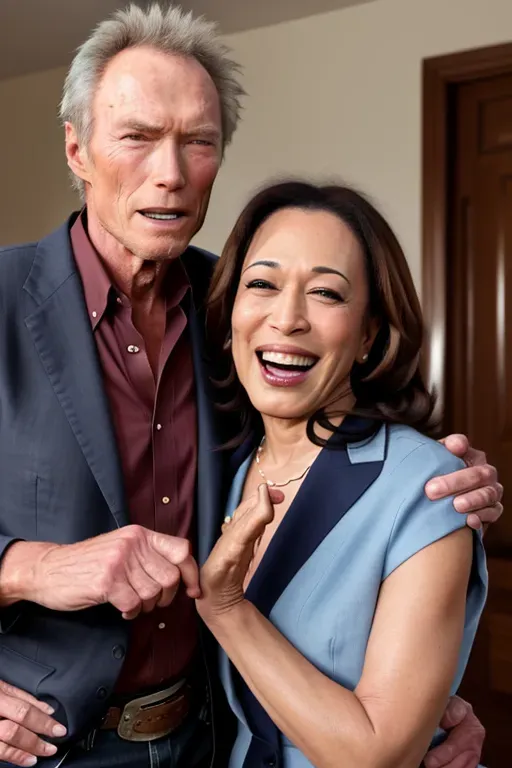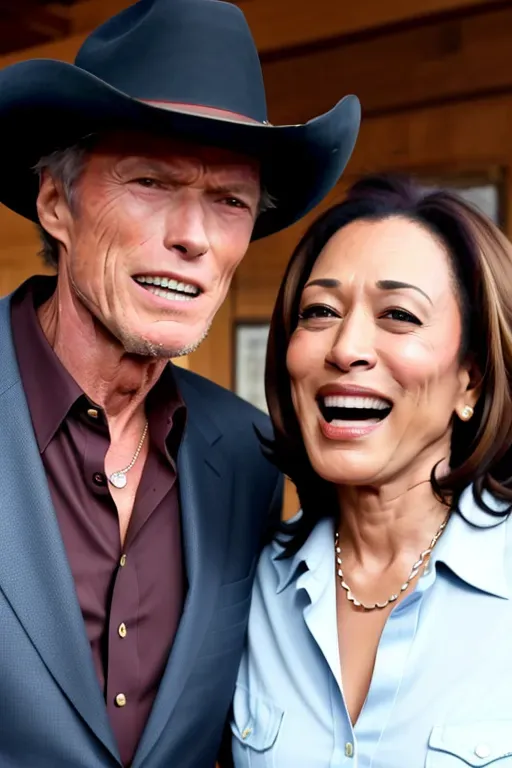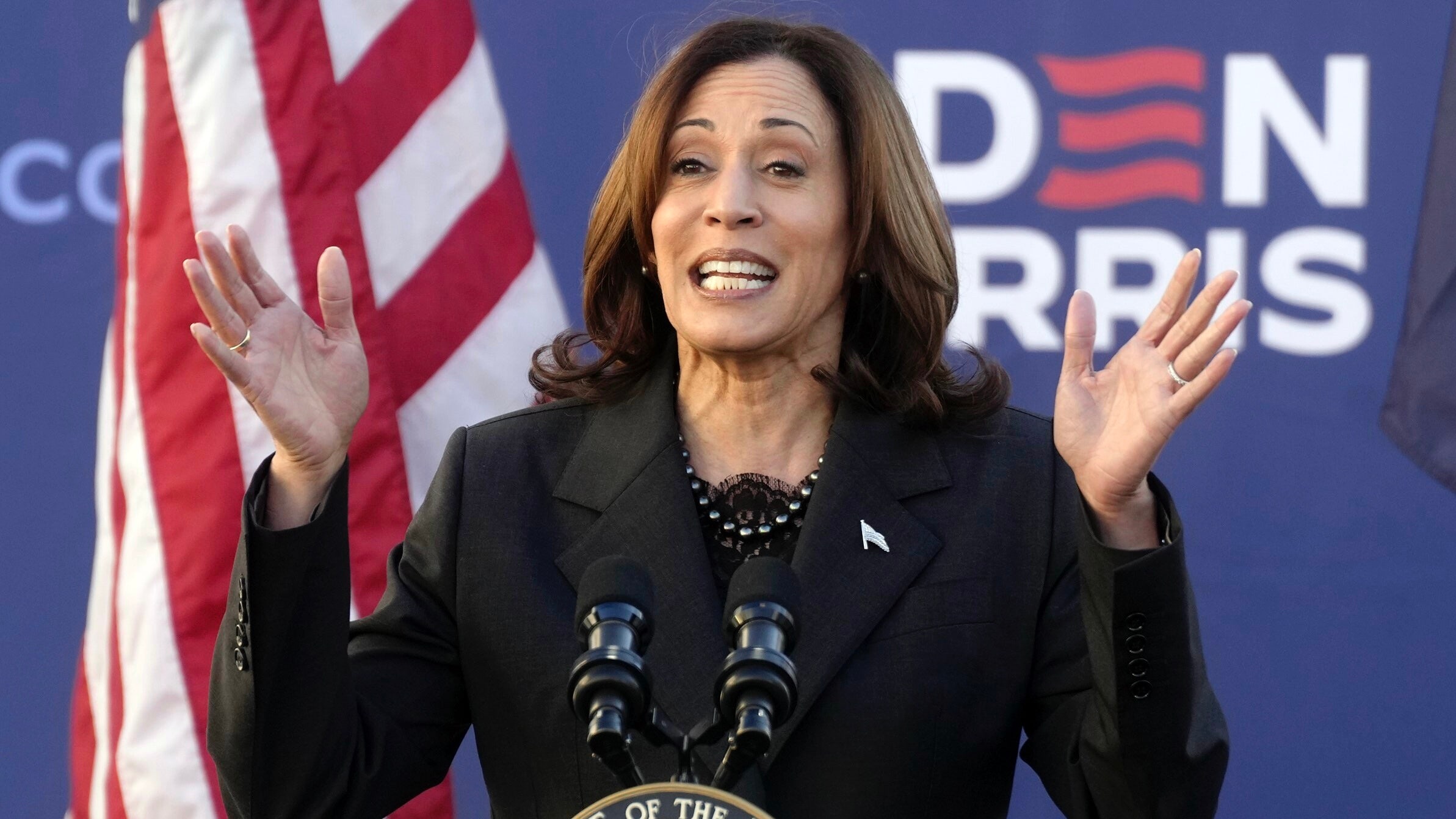Clint Eastwood & Kamala Harris: Intersections In American Culture
Does the rugged, stoic persona of Clint Eastwood, a titan of American cinema, align with the groundbreaking political career of Kamala Harris? The answer, shrouded in the complexities of personal beliefs and public perception, is a fascinating study of contrasts and unexpected intersections within the American cultural landscape. The lives of these two influential figures, one a legendary filmmaker and actor, the other a pioneering politician, offer a unique lens through which to examine the evolving narrative of the United States.
Eastwoods name is synonymous with iconic roles and directorial prowess, while Harris has made history as the first female Vice President. Both have carved out indelible places in the public eye. But beyond their public images, what connections, if any, exist? This article delves into their careers, their impact on society, and any subtle, or not-so-subtle, connections that may exist. It's a journey that probes into the interplay between the worlds of Hollywood and Washington D.C., exploring the cultural significance of two seemingly disparate figures.
| Category | Clint Eastwood | Kamala Harris |
|---|---|---|
| Full Name | Clinton Eastwood Jr. | Kamala Devi Harris |
| Date of Birth | May 31, 1930 | October 20, 1964 |
| Place of Birth | San Francisco, California, USA | Oakland, California, USA |
| Education | Los Angeles City College (attended) | Howard University (B.A.), University of California, Hastings College of the Law (J.D.) |
| Occupation | Actor, Film Director, Producer, Composer | Politician, Lawyer |
| Political Affiliation (Publicly Known) | Republican (Historically) | Democratic Party |
| Notable Roles/Positions |
|
|
| Significant Awards/Achievements |
|
|
| Personal Life (Brief) | Married and divorced multiple times; father of several children. Known for a private personal life. | Married to Douglas Emhoff. |
| Website Link for Reference | IMDb - Clint Eastwood | The White House - Kamala Harris |
Clint Eastwood's cinematic journey began with an inauspicious start as a contract actor for Universal Pictures in 1955. From that humble beginning, he ascended to become one of the most recognizable faces and influential figures in Hollywood. His filmography includes 46 starring roles, 57 acting appearances overall, 25 directorial credits, and 20 producer credits. The strength and toughness he exudes, as observed by many, resonates with a traditional kind of masculinity reminiscent of old-school tough guys.
In the realm of American politics and cinema, the names Clint Eastwood and Kamala Harris carry significant weight. While their primary spheres of influence the silver screen and the political arena seem worlds apart, the threads of American culture and identity intertwine them. Their lives and careers, when examined more closely, reveal surprising overlaps, shared experiences, and instances of connection.
The question of whether Clint Eastwood supports Kamala Harris has become a topic of interest among political enthusiasts and fans of the iconic filmmaker. Eastwood, a man who has often guarded his political preferences closely, has left a trail of hints, anecdotes, and actions that invite speculation. His known historical alignment with the Republican party, alongside his often-conservative portrayals in film, may give pause to those who anticipate a public endorsement. However, the complex nature of Eastwoods public persona makes any straightforward answer difficult.
The goal of this exploration is not to provide definitive answers, but to encourage a comprehensive understanding of the two personalities, examining their lives, careers, and the societal issues they have addressed. By highlighting the connections between these two prominent figures, this analysis aims to promote a deeper understanding of the interplay between cinema and political discourse in America. The fact that these two have carved out such significant places in the public eye adds to the intrigue.
Eastwood's filmography reflects an ethos in American cinema characterized by rugged masculinity and complex character portrayals. Films like "Dirty Harry" and "Unforgiven" are considered hallmarks of his career, each film and performance adding depth and nuance to his contributions. The characters he brings to life often embody themes of justice, self-reliance, and the complexities of moral choices.
Kamala Harris, on the other hand, represents a pivotal shift in American politics and culture. She has made significant strides in the political arena, advocating for social justice and equality. Her groundbreaking role as the first female, first Black, and first South Asian Vice President of the United States marks a turning point in the nations history.
On May 28, 2024, an X (formerly Twitter) user, @nikkipreston107, posted a claim about Clint Eastwood's perspective on American politics, specifically concerning Republicans, Democrats, and the potential future of the Southwest U.S. This online exchange, though brief, reflects the broader context where public figures' opinions, even if they're not directly stated, are scrutinized and dissected. Such interactions underscore how figures like Eastwood and Harris are subject to constant public speculation and how their every move can be analyzed through a political lens.
The story of Clint Eastwood, a legendary figure in American cinema, is a story of enduring influence. His career, spanning over six decades, has left an indelible mark on the film industry. Whether starring, directing, or producing, Eastwood's films continue to resonate with audiences across generations. His contribution to the cultural narrative of America cannot be overstated.
The article is written to explore the connections and contrasts between the two figures. It will consider their individual contributions and the ways they have shaped public perception, providing insights into their philosophies, careers, and the cultural significance they hold in contemporary America. It should be noted that, as is the case with any public figure, perceptions and interpretations can be subjective. The goal is to present a balanced overview, grounded in facts, while acknowledging the potential for diverse viewpoints.
In a world where film and politics often intersect, understanding the contributions of Eastwood and Harris offers insight into the American identity and the evolving narrative of the nation. The question of whether these two figures truly "intersect" is an ongoing one, best understood by examining the larger context within which their lives and careers have unfolded.
A particular anecdote surfaces: "Clint Eastwood was there," as noted in one account, "and he spilled champagne on the speaker's new steady, Kamala Harris." This seemingly minor incident, if accurate, reveals an unexpected intersection of their personal lives and, for some, suggests at least an indirect level of association. Whether this encounter signifies anything more than a casual social interaction is a matter of speculation; however, it further underscores the point about the intertwining nature of the public and private lives of prominent individuals.
Several sources, including newspaper columns, have documented the interaction. The connection, as it is, is minimal, and this article does not aim to suggest any deeper relationship than what is already publicly known. This story, and others like it, demonstrate how even brief encounters between celebrities and politicians, when they occur, often become fodder for public discussion. It highlights the degree to which the public seeks to find connections between the lives of these figures.
The question of whether or not Eastwood has any allegiance toward Harris remains open. There is no explicit endorsement publicly available. However, Eastwood has shown an interest in politics over the years, making it a topic worth exploring.
The "Kamala Harris 2024 election shirts" represent an example of how political figures become integrated into popular culture, even if peripherally. This serves as a good point to highlight how political figures are frequently commodified and become parts of the marketing strategies. The political landscape and the worlds of advertising, branding, and cultural trends intertwine and blend.
Clint Eastwood and Kamala Harris represent two very different worlds: Hollywood and politics, respectively. But their names have crossed paths occasionally, and how they interact is a very interesting topic of discussion, especially when one considers how much the American public keeps up with both cinema and politics.
In order to understand the contributions of both figures, we will dissect their biographies, philosophies, and public personas. This will provide an insight into the American identity and the evolution of the nation's narrative. This article intends to delve into the lives and the contributions of these two figures, as well as examine the different aspects of American culture that come to light as we explore their paths.



Detail Author:
- Name : Ransom Ratke MD
- Email : balistreri.vivian@steuber.com
- Birthdate : 1976-05-29
- Address : 348 Davis Brook Gerholdburgh, AZ 17559
- Phone : +18288769539
- Company : Funk LLC
- Job : Librarian
- Bio : Id similique cumque aperiam incidunt. Quam quae debitis ipsum et non cupiditate libero. Impedit dignissimos aliquid occaecati animi reprehenderit eaque.